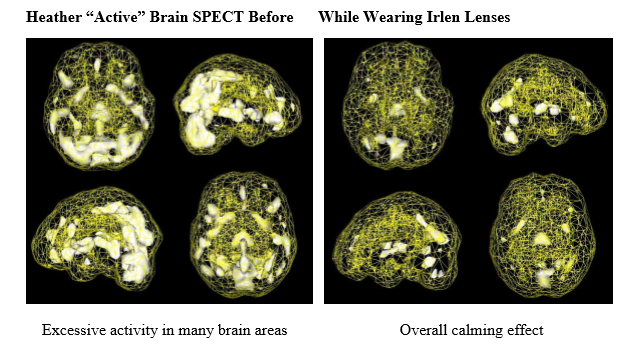
Imagine sitting in a room at home with goggles and headphones on. Strobe lights flicker through the goggles and pulses come through the headphones, both designed to stimulate your mind. Our minds think in states of brain- wave frequency, and changes in frequencies are based on brain activity. When we stimulate the brain audiovisually with light and sound pulses, it begins to mimic or follow the same frequencies.
Irlen Lenses: Brain-Calming Glasses
When a patient who had severe, debilitating migraine headaches told us that being diagnosed with and treated for Irlen syndrome completely cured her headaches, we wanted to help more like her. Helen Irlen, PhD, is a school psychologist. Back in the early 1980s she was working under a federal research grant with college-educated adults who struggled with learning and reading difficulties. At that time, she discovered that colored, filtered lenses could reduce stress on the brain and allow it to function better.
Irlen Syndrome is a visual processing problem, where certain colors of the light spectrum tend to irritate the brain. It runs in families and is common after traumatic brain injuries. Anyone experiencing symptoms of anxiety, irritability, depression, or decreased concentration should be screened for Irlen syndrome. Common symptoms include:
• Light sensitivity; being bothered by glare, sunlight, headlights, or streetlights
• Strain or fatigue with computer use
• Fatigue, headaches, mood changes, restlessness, or an inability to stay focused when in a room with bright or fluorescent lights
• Trouble reading words that are on white, glossy paper
• Words or letters shifting, shaking, blurring, moving, running together, disappearing, or becoming difficult to perceive while reading
• Feeling tense, tired, or sleepy when reading, or even getting headaches when reading
• Problems judging distance and difficulty with such things as escalators, stairs, ball sports, driving, or coordination
• Migraine headaches
Meet Heather
Heather, 42, had been in 10 car accidents when she came to see us for symptoms of ADHD, anxiety, and depression. During her history she told one of our physicians that she had trouble reading and fluorescent lights gave her headaches. Suspecting Irlen Syndrome, he sent her for an evaluation.
When we saw Heather two weeks later, she was beaming. With the Irlen lenses, her focus was better, her anxiety was reduced, and her mood had improved. Her prior brain scan had been remarkably overactive, but the Irlen lenses significantly calmed her brain.
Heather’s Next Phase Of Healing
We were excited about Heather’s progress until a few weeks later when her physician reported she was struggling with depression. Here’s the rest of the story. When Heather was a child, she was a prodigy guitar player. Apparently, she was amazing and gave performances around the area where she lived. But she could never learn to read music because the notes would move and dance on the page. At the age of 12, she took the guitar and smashed it, and she never played again. Now, 30 years later, she finds out that she has Irlen Syndrome and is mourning the loss of what could have been.
Heather did not need Prozac to deal with the depression. She needed grief therapy, which we gave her. Within a few weeks she was back to feeling great and bought herself a new guitar.
Dealing with a condition like Heather’s can be challenging in many areas of day-to-day functioning, especially when symptoms are compounded by other mental health issues. If you want to read more stories like Heather’s, we recommend reading Dr. Daniel Amen’s new book, “Feel Better Fast And Make It Last.” You can order the book by clicking here.
For more information on how SPECT imaging can help provide a customized treatment plan to help heal your brain, call us today at 888-288-9834 or visit us online to schedule a visit.






I have a sister with early onset dementia. We noticed that she is having more problems recognizing objects. It is not visual but more in the processing of information. If she is looking for a coffee cup it must look like a cup she has in her brain i.e. won’t see a styrafome cup right in front of her as it doesn’t match her image.
Is this something simular to Irlen syndrome? would lenses help with her preceptions or help retrain her brain?
Comment by Rita Schulte — November 24, 2018 @ 8:32 AM
I was diagnosed with Irlen Syndrome as a teacher about 15 years ago. One of my colleagues was a screener for Helen Irlen (her offices are local to us) and noticed from my comments and behavior that I might need some help. I got all the way through University and Credentialling with issues reading, blinding white flashes around words on white paper, re-reading more than normal, headaches and migraines especially with bright sunlight, etc. Getting my glasses and sunglasses lenses tinted with the correct colors made all the difference. Reading is comfortable now as is transitioning from indoors to outdoors and sunlight.
Comment by Rachel Anne Santos — November 28, 2018 @ 6:54 AM
My husband had a stroke that affected his vision. He was functioning normally until 9 months later had his first seizure.
He cannot tolerate bright lights, sunlight, light reflecting off a lake,busy patterns, noise,can’t concentrate. It’s getting worse. He is losing hope and thinks he’s having a nervous breakdown. He is definitely suffering more than ever.
How can I find information about these special glasses and can seizures cause Irien Syndrome?
(He has had 7 granmal seizures since Aug. 2015, the last one Dec. 2017 but has been experiencing absent seizures more frequently especially lately as he’s been under a lot of stress)
With gratitude,
Taryn
Comment by Taryn — January 9, 2019 @ 10:41 AM
I’m wondering if there is a similar syndrome that relates to hearing. I notice my dad hears but does not process well, or there is a significant delay in the processing of words, even instrumental music, sometimes with irritability due to either the volume, cadence, or pitch. Perhaps certain filters of disruptive/irritating sound waves would be a hearing aide customization that could help with this?
Comment by Holly — February 1, 2019 @ 12:18 PM
I’m a 21 year old with irlens I have had irlen lenses since I was 14 but I felt they never fully worked as is the case with a lot of people with irlen syndrome. Because of this I never read a book as I could barely make it passed a page without the words moving everywhere and then getting a headache. I recently started smoking small amounts of cannabis and I can now read perfectly. I am very curious to know if anyone else has found this? Not condoning the use of illegal drugs what so ever but as a harmless legal drug in most states it is definitely food for thought
Comment by Jack — April 17, 2020 @ 5:23 AM
I have been told by an eye Dr that my kiddo has a message from brain to eye issue and his teacher an I feel it’s dyslexia, we live in Navarre Florida can you please guide me on what I need to do to help him correct this or learn how to help him
Comment by Antoinette Johnson — February 5, 2024 @ 5:59 PM